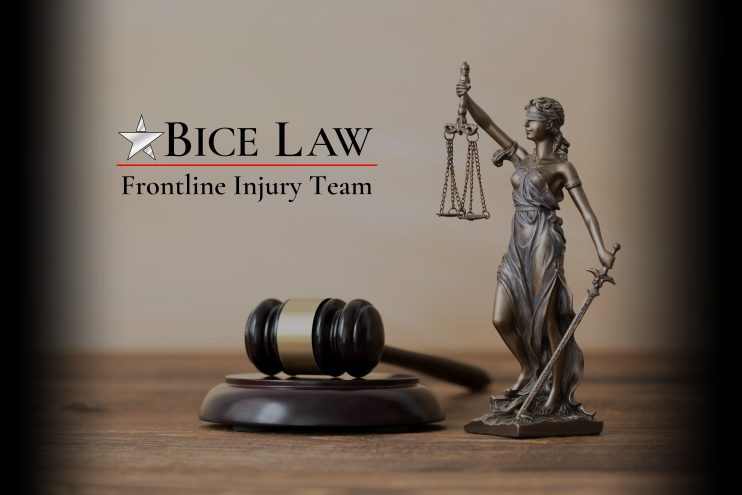Injured at work near Winston-Salem?
 After a work injury, contact the experienced Winston-Salem Workers’ Compensation Lawyer at Bice Law. We are here to fight for you! If you have been injured on the job and are in need of an experienced Winston-Salem Worker’s Compensation Lawyer, Bice Law is the firm that you want on your side. Our firm has expertise in successfully handling countless worker’s comp claims, and we fight for our clients from consultation to settlement! Being out of work is stressful enough without having to navigate the difficulties of a worker’s compensation claim. At Bice Law, we take the worry from our clients and fight for them every step of the way to ensure they get the maximum amount of benefits and compensation from a worker’s comp claim.
After a work injury, contact the experienced Winston-Salem Workers’ Compensation Lawyer at Bice Law. We are here to fight for you! If you have been injured on the job and are in need of an experienced Winston-Salem Worker’s Compensation Lawyer, Bice Law is the firm that you want on your side. Our firm has expertise in successfully handling countless worker’s comp claims, and we fight for our clients from consultation to settlement! Being out of work is stressful enough without having to navigate the difficulties of a worker’s compensation claim. At Bice Law, we take the worry from our clients and fight for them every step of the way to ensure they get the maximum amount of benefits and compensation from a worker’s comp claim.
If you have been injured on the job in Winston-Salem, North Carolina and you were denied worker’s compensation benefits or are not getting the benefits you need, a personal injury attorney should be your next step. Bice Law is a dedicated Personal Injury Law Firm unlike any other. Our Firm’s Difference is that we focus on what we can do for our clients, not what they can do for us. You’ll find that most law firms practice several different areas of law. Bice Law specializes in only personal injury. Our firm doesn’t dabble in any other area of law that would take away from our team being the best Personal Injury Law Firm.
Bice Law is a personal injury firm in Winston-Salem with extensive experience handling worker’s compensation claims and a success rate proven by the benefits and settlements that we have won for our worker’s compensation clients. Call Bice Law today for a FREE CONSULTATION with an experienced Winston-Salem Worker’s Compensation Lawyer. Our firm has helped countless victims injured while on the job. Let Bice Law help you!
What to Do After Being Injured at Work
If you were injured on the job in Winston-Salem, you’ll need to know what to do after being injured at work. Experiencing an injury at work can be a daunting and stressful experience and knowing the right steps to take can make all the difference in securing your rights and receiving the compensation you deserve. As seasoned workers’ compensation lawyers, we understand the intricacies of navigating these situations and can provide you with a comprehensive roadmap of what to do immediately following a workplace injury to protect yourself and your future.
Report the Incident Immediately: The first and most crucial step after being injured at work is to report the incident to your employer as soon as possible. Many states have strict deadlines for reporting workplace injuries, so it’s essential to notify your employer promptly. Be sure to document the details of the accident, including the date, time, location, and how it occurred.
Seek Medical Attention: Your health and safety should be your top priority. Even if your injury seems minor, it’s crucial to seek medical attention promptly. Not only does this ensure that you receive proper care, but it also creates a record of your injury, which is essential for your workers’ compensation claim.
Gather Evidence: Collecting evidence related to your injury can significantly strengthen your workers’ compensation claim. Take photos of the accident scene, your injuries, and any hazardous conditions that may have contributed to the incident. Additionally, gather contact information from any witnesses who saw what happened.
File a Workers’ Compensation Claim: Once you’ve reported the incident to your employer and sought medical attention, it’s time to file a workers’ compensation claim. This typically involves completing the necessary forms provided by your employer or their workers’ compensation insurance carrier. Be sure to include detailed information about your injury and how it has affected your ability to work.
Follow Doctor’s Orders: Throughout the recovery process, it’s essential to follow your doctor’s orders diligently. Attend all medical appointments, adhere to prescribed treatments, and follow any restrictions or limitations outlined by your healthcare provider. Failure to comply with medical recommendations could jeopardize your workers’ compensation benefits.
Know Your Rights: As an injured worker, you have rights under workers’ compensation laws. These rights include the right to medical treatment, disability benefits, and vocational rehabilitation services. Understanding your rights and entitlements is essential for advocating for yourself throughout the claims process.
Consult with a Workers’ Compensation Lawyer: Navigating the workers’ compensation process can be complex and overwhelming, especially if your claim is disputed or denied. Consulting with an experienced workers’ compensation lawyer can provide invaluable guidance and advocacy to ensure your rights are protected. A lawyer can help you understand your legal options, negotiate with insurance companies, and represent you in any hearings or appeals proceedings.
By promptly reporting the incident, seeking medical attention, gathering evidence, filing a claim, following medical advice, consulting with a lawyer, and knowing your rights, you can position yourself for a successful outcome and secure the compensation you deserve. If you’ve been injured at work, don’t hesitate to contact Bice Law. We have the experience you want on your side and we fight for our clients from consultation to settlement!
What are the Worker’s Compensation Laws in North Carolina?
What Work Injuries Qualify For Worker’s Compensation?
If you have been injured while working for an employer in Winston-Salem, you may be entitled to workers’ compensation benefits. A question often asked is “What work injuries qualify for workers’ compensation?”. Understanding which injuries are accepted under North Carolina workers’ compensation benefits is crucial for both employees and employers. To receive workers’ compensation, you must have been employed at the time you are injured, and the injury must be a direct result of the employment. Your injuries must be caused by whatever tasks you have been assigned while employed.
Qualifying Work Injuries
Accidental Injuries: Most commonly, North Carolina workers’ compensation benefits cover injuries resulting from accidents that occur in the workplace. These injuries can encompass a wide range of situations, from slip and fall accidents to injuries caused by falling objects or machinery malfunctions. Essentially, if the injury occurs during the course of employment and arises out of job-related duties, it is typically eligible for workers’ compensation benefits.
Repetitive Stress Injuries: Not all workplace injuries are the result of sudden accidents. Repetitive stress injuries, also known as cumulative trauma disorders, are covered under North Carolina’s workers’ compensation system. These injuries often develop over time due to repeated motions or strain at work. Examples include carpal tunnel syndrome from constant typing or tendonitis from repetitive lifting.
Occupational Diseases: Workers’ compensation benefits in North Carolina also extend to cover occupational diseases. These are illnesses or health conditions that develop due to workplace exposures or conditions. Examples include respiratory conditions caused by exposure to toxic chemicals, asbestosis from asbestos exposure, and hearing loss due to prolonged exposure to loud noise levels at work.
Aggravation of Pre-existing Conditions: North Carolina’s workers’ compensation system recognizes that pre-existing medical conditions can be aggravated or worsened by workplace injuries or activities. In such cases, if the work-related factors contribute to the worsening of a pre-existing condition, the injured employee may be eligible for workers’ compensation benefits.
Mental Health Injuries: Mental health injuries are also eligible for workers’ compensation benefits in North Carolina. However, these cases can be complex and often require evidence to demonstrate that the mental health condition is a direct result of work-related stressors or traumatic events on the job.
Fatal Injuries: In tragic cases where a work-related injury or illness leads to the death of an employee, workers’ compensation benefits can extend to the deceased worker’s dependents. These benefits may include compensation for funeral expenses and financial support for surviving family members.
It’s important to note that, in North Carolina, the key factor in determining eligibility for workers’ compensation benefits is whether the injury or illness arose out of and in the course of employment. This means that the injury must be directly related to job duties or conditions. Additionally, employees are generally required to report their injuries to their employers promptly, usually within 30 days, to be eligible for benefits.
Factors Affecting Eligibility. It’s important to note that qualifying for workers’ compensation isn’t solely determined by the nature of the injury. Several factors can influence eligibility, such as:
Employment Status: Generally, only employees are eligible for workers’ compensation benefits, not independent contractors or volunteers.
Notification: Reporting the injury to the employer within the specified timeframe is crucial. Failing to report the injury promptly might impact eligibility.
Causation: The injury must be directly linked to work-related tasks or conditions. If the injury occurs outside the scope of work activities, it might not qualify.
Time and Place: The injury must occur during work hours and at a location where work duties are typically performed.
Adherence to Procedures: Following the proper procedures for filing a workers’ compensation claim is essential. This includes providing necessary documentation and cooperating with medical evaluations.
Understanding the criteria for eligibility, as well as adhering to reporting and filing procedures, ensures that injured workers receive the necessary benefits to aid in their recovery and well-being. If you’ve been injured at work and believe you might qualify for worker’s compensation, contact Bice Law! Our Frontline Injury Team can help you navigate the workers’ compensation process effectively.
Can I see my own doctor for a work injury?
When you sustain a work-related injury, the process of seeking medical treatment can raise questions about whether you can see your own doctor or if you’re required to visit a physician selected by your employer’s workers’ compensation insurance. Understanding your rights and options in this matter is crucial to ensure proper medical care and a smooth workers’ compensation claim process.
Your Right to Choose. In many cases, you have the right to choose your own doctor for treating a work-related injury. However, this may vary depending on the specific workers’ compensation laws in your state. It’s important to check your state’s regulations to know your rights accurately.
Employer’s Choice of Doctor. In some cases, your employer’s workers’ compensation insurance might have a preferred provider network, and you may be required to seek medical treatment from a doctor within that network. This is common in situations where the insurance company is responsible for covering your medical expenses.
Second Opinions. If you choose to see your own doctor but the insurance company requires an evaluation by one of their doctors, you may be entitled to a second opinion from your chosen physician. However, this process can be subject to certain rules and regulations, so it’s important to consult with an experienced Winston-Salem worker’s compensation attorney who is well-versed on your state’s workers’ compensation guidelines.
Communication is Key. Whether you choose your own doctor or follow your employer’s preferred provider network, communication is crucial. Notify your employer and the insurance company about your choice of doctor and make sure all medical records and bills are properly documented.
Understanding your rights and responsibilities in this matter is essential to ensure you receive appropriate medical care and that your workers’ compensation claim proceeds smoothly. Weigh the pros and cons of seeing your own doctor versus an employer-selected physician, and always ensure clear communication with all relevant parties to ensure your well-being and your claim’s success. If you’re unsure about your rights or how to proceed, consulting with a Winston-Salem injury attorney experienced in North Carolina workers’ compensation law can provide valuable guidance.
What benefits are covered by Worker’s Compensation?
Workers’ compensation in North Carolina provides benefits to employees who experience work-related injuries or illnesses. These benefits are designed to alleviate the financial and emotional stress that accompanies said work-related injuries and illnesses. From medical treatment coverage to various forms of wage replacement and support, these benefits ensure that injured workers receive the care and assistance they need to recover, maintain financial stability, and regain their quality of life. Understanding the scope of these benefits is crucial for both employees and employers, as it enables them to navigate the workers’ compensation process effectively and ensure that injured workers receive the support they deserve. Below we’ll detail the range of benefits that workers’ compensation covers in North Carolina.
Medical Treatment: Injured employees are entitled to receive necessary medical treatment, including doctor visits, hospital stays, surgeries, medications, and rehabilitation services. The medical expenses are typically covered by the employer’s workers’ compensation insurance.
Temporary Total Disability Benefits: If the injured employee is unable to work for more than seven days, they may be eligible for temporary total disability benefits, which provide a portion of their lost wages during their recovery period.
Temporary Partial Disability Benefits: If the employee can work in a limited capacity while recovering, but their earnings are reduced due to the injury, they may receive temporary partial disability benefits to compensate for the wage difference.
Permanent Partial Disability Benefits: If the injury results in permanent impairment or loss of function, the employee may be entitled to permanent partial disability benefits. The amount is determined based on the extent of the impairment and its impact on the employee’s ability to work.
Permanent Total Disability Benefits: In cases where the employee’s injury leaves them permanently unable to work, they may receive permanent total disability benefits, which provide ongoing financial support.
Vocational Rehabilitation: Injured employees may receive vocational rehabilitation services to help them reenter the workforce if they are unable to return to their previous job due to the injury.
The duration of workers’ compensation benefits varies based on the nature and severity of the injury. Temporary benefits like TTD and PPD are typically provided until the employee has recovered or reached maximum medical improvement. Permanent benefits like PTD are designed to provide ongoing support.
Are Mental Health Conditions Covered by Worker’s Compensation?
Yes, in North Carolina, workers’ compensation can cover mental health conditions that are related to work-related stress or trauma under certain circumstances. However, it’s important to note that claims for mental health conditions can be more complex to establish compared to physical injuries. Here are some key points to consider:
Establishing Causation: For a mental health condition to be covered under workers’ compensation, it generally needs to be proven that the condition directly resulted from work-related stressors or trauma. This can be challenging, as mental health conditions often have multiple potential causes.
Types of Covered Mental Health Conditions: North Carolina workers’ compensation may cover conditions such as anxiety, depression, and post-traumatic stress disorder (PTSD) if they can be directly linked to specific work-related incidents or conditions.
Work-Related Stressors: Stressors that are typically considered for coverage include traumatic events that occurred in the workplace, such as witnessing a serious accident, being a victim of workplace violence, or being exposed to a dangerous incident.
Job-Related Factors: In some cases, chronic stress resulting from excessive workload, harassment, bullying, or hostile work environments may be considered for coverage. However, proving a direct link between these factors and the development of a mental health condition can be more complex.
Normal Work Stress vs. Extraordinary Stress: North Carolina workers’ compensation law often requires that work-related stress or trauma is of an extraordinary nature beyond the normal stresses that come with the job. This means that the stressors need to be unusual or unexpected to qualify for coverage.
Medical Documentation: Just like with physical injuries, medical documentation is essential when filing a claim for a mental health condition. A qualified medical professional needs to provide evidence linking the condition to work-related stressors.
Burden of Proof: The burden of proving the connection between the mental health condition and work-related factors rests on the employee seeking workers’ compensation benefits.
It’s important to consult with an experienced workers’ compensation attorney if you believe you have a valid claim for a mental health condition related to work-related stress or trauma. These cases can be complex, and an attorney can help you navigate the legal process, gather necessary evidence, and present a strong case for your claim. Additionally, the laws and regulations surrounding workers’ compensation can change, so seeking up-to-date legal advice is recommended.
After a Work Injury in Winston-Salem | Contact Bice Law
Filing a work injury claim and obtaining your worker’s compensation benefits can be a confusing and frustrating process. If you have been hurt on the job and need a work injury lawyer in Winston-Salem, Bice Law is ready to fight for you and get you the help that you need to recover. Our firm serves work injury victims in Winston-Salem, throughout York County, and across North Carolina. If you have been seriously injured in a worker’s compensation accident in Winston-Salem, take the first step to protect your legal rights and contact Bice Law. Results are how we measure success – we’ve built a strong reputation both in and out of the courtroom, and we’ll put our experience and expertise to work on your behalf.
Don’t hesitate, there s only a 3-year window to file a lawsuit for your personal injury claim. If you or someone you know has been injured in the Winston-Salem area, call the experienced Winston-Salem car accident lawyer at Bice Law. We’re ready to fight for your rights and get you the compensation that you deserve. Our Frontline Injury Team fights for our clients from consultation to settlement, and we don’t get paid unless you do. Call Bice Law today! 877-BICE-877
Call Bice Law TODAY
Bice Law LLC | Winston-Salem

Address: 615 St. George Square Court, Winton-Salem, NC 27103
Phone: (336)272-2277


 Are you searching for an experienced workers’ compensation lawyer in Winston-Salem, NC, to help you navigate the complexities of your work-related injury claim? Bice Law has the experience to handle any work-related injury claim. We understand how overwhelming it can be to deal with the aftermath of a workplace injury, which is why having the right legal representation on your side is crucial. Our team fights for clients from consultation to settlement and we won’t stop until you get the compensation that you’re entitled you.
Are you searching for an experienced workers’ compensation lawyer in Winston-Salem, NC, to help you navigate the complexities of your work-related injury claim? Bice Law has the experience to handle any work-related injury claim. We understand how overwhelming it can be to deal with the aftermath of a workplace injury, which is why having the right legal representation on your side is crucial. Our team fights for clients from consultation to settlement and we won’t stop until you get the compensation that you’re entitled you.
